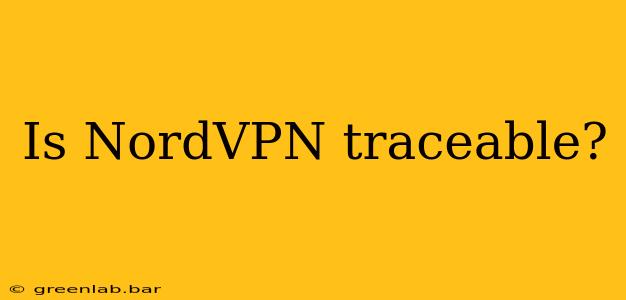The question of whether NordVPN is traceable is a crucial one for anyone prioritizing online privacy and security. The short answer is: it's significantly harder to trace your online activity when using NordVPN compared to using a standard internet connection, but not impossible. This article will delve into the technical aspects, potential vulnerabilities, and best practices to maximize your anonymity while using NordVPN or any VPN service.
Understanding How VPNs Work and Their Limitations
VPNs (Virtual Private Networks) work by encrypting your internet traffic and routing it through a secure server controlled by the VPN provider. This masks your IP address, making it difficult to pinpoint your geographical location and online activity. NordVPN, like other reputable providers, uses strong encryption protocols like AES-256, a standard considered virtually unbreakable by current technology.
However, it's vital to understand that a VPN isn't a foolproof shield against all forms of tracking. Several factors can potentially compromise your anonymity:
Potential Vulnerabilities and Traceability Risks:
-
VPN Provider Logs: While NordVPN maintains a strict no-logs policy, it's crucial to trust that this policy is genuinely implemented and adheres to high security standards. A data breach or legal pressure could theoretically expose user data. Thorough independent audits, transparent security practices, and a strong reputation are key factors to consider when selecting a VPN provider.
-
DNS Leaks: DNS (Domain Name System) leaks can reveal your real IP address even when using a VPN. Ensure your chosen VPN provider offers DNS leak protection, and regularly test for leaks using online tools.
-
WebRTC Leaks: WebRTC (Web Real-Time Communication) is a technology used for real-time communication in web browsers. It can inadvertently leak your real IP address despite using a VPN. Again, reputable VPNs employ countermeasures, but it's prudent to check for WebRTC leaks as well.
-
Malware and Spyware: Malware or spyware installed on your device can bypass your VPN and track your activity. Maintaining strong cybersecurity practices, such as using up-to-date antivirus software and firewalls, is essential.
-
Government Surveillance and Legal Requests: Governments can exert pressure on VPN providers, potentially obtaining user data through legal means or surveillance techniques. This is a risk inherent in using any online service.
-
Your Own Online Behavior: Using unsecured Wi-Fi networks, visiting suspicious websites, or downloading untrusted files can all expose your identity even when using a VPN.
Best Practices to Minimize Traceability with NordVPN
To maximize your anonymity and minimize the risk of traceability while using NordVPN, follow these best practices:
-
Choose a Reputable Provider: Thoroughly research the VPN provider's reputation, security practices, and no-logs policy. Independent audits are a strong indicator of trust.
-
Use Strong Passwords and Two-Factor Authentication (2FA): Protect your NordVPN account with strong, unique passwords and enable 2FA for enhanced security.
-
Regularly Update Your Software: Keep your operating system, VPN client, antivirus software, and other security applications updated to patch known vulnerabilities.
-
Use a Secure Internet Connection: Avoid using public Wi-Fi hotspots unless absolutely necessary. If you must use public Wi-Fi, consider using a VPN with a kill switch feature to prevent data leaks if the VPN connection drops.
-
Be Mindful of Your Online Activity: Avoid visiting suspicious websites, downloading untrusted files, and engaging in activities that could expose your identity.
-
Regularly Check for Leaks: Periodically test for DNS and WebRTC leaks using online tools to ensure your real IP address isn't exposed.
Conclusion: Enhanced Privacy, Not Absolute Anonymity
NordVPN, when used correctly and with an understanding of its limitations, significantly enhances your online privacy. However, it doesn't guarantee complete anonymity. By following the best practices outlined above and remaining vigilant about your online habits, you can substantially reduce your risk of being traced while enjoying the benefits of enhanced online security and privacy. Remember, a multifaceted approach to online security is always the most effective.

